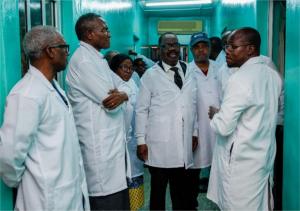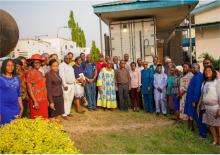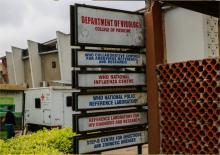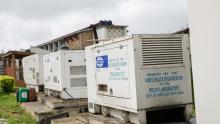The Ibadan National Poliovirus Laboratory – A symbolic icon in Nigeria’s war against polio
Abuja, 9 January, 2020 - Standing at two stories tall and strategically tucked away in a silent corner of the University College Hospital, Ibadan The National oliovirus laboratory can be described as a symbolic icon in Nigeria’s fight against polio.
Established in 1993 but officially launched in 1996, the laboratory has passed series of accreditation by the World Health Organization (WHO) and has the capacity to detect, identify, and promptly report wild polioviruses (WPV), vaccine derived polioviruses (VDPV), Sabin viruses and other enteroviruses that may be present in clinical and environmental specimens.
Assiduously working in the fight against poliovirus for over 12 years, Dr Adeniji Adekunle is the Director of the poliovirus laboratory in Ibadan. He states “Since the launch of this facility in 1996, we have collected and tested over 100,000 stool and sewage samples.”
Describing the magnitude of their work and capacity built over the years Dr Adekunle says,
“In 2011, we constructed another huge laboratory to focus on environmental surveillance of poliovirus and we were the first in the African Region. The laboratory operates under the University of Ibadan College of Medicine and the Department of Virology and we have a total of 19 well trained staff including data managers, technical supervisors, laboratory technologists, assistants and attendants.
A disease surveillance notification officer’s (DSNO) testimony
Mr Hashiru Garba, a DSNO travelled all the way from Zamfara State, (a 10-hour drive to Oyo) with some stool samples for testing.
“This is the one laboratory I respect so much in Nigeria”, he says. “I like how professional and efficient they are, I’m always impressed at the accuracy of results”.
Sample collection and testing to ensure no trace of polio transmission is missed
The Ibadan Polio laboratory currently receives stool samples from cases of Acute Flaccid Paralysis (AFP) from 26 states and the Federal Capital Territory (FCT), while the Maiduguri laboratory receives samples from 10 states.
Since the addition of environmental surveillance services in the laboratory, there has been an increase in the number of tested sewage samples over time.
Over the years, the laboratory witnessed an increase in the number of samples collected annually from an estimated 5,000 to 12,000 samples. Furthermore, samples from sewage and contaminated water have been collected from over 113 sites in 29 states and the FCT.
In 2014, 16,000 AFP stool samples were collected and in 2017, nearly 20,000 samples were collected. Due to a series of measures put in place by the surveillance team in the country to improve on the quality and sensitivity of surveillance, the number of stool samples from AFP cases collected in 2018 and 2019 have reduced to about 11,00 (2018) and 4,976 (from 01 January to 28 June 2019) as a result of improving surveillance quality. Regarding samples from environmental surveillance activities, in 2017 a total of 1,700 samples were collected, while in 2018, roughly 1,632 were collected. As of December 2019, 2,090 samples were collected.
Nostalgic of his time as the Head of the Department of Virology at the University of Ibadan, Regional Virologist for the WHO Africa Region for 10 years and now current member of the Africa Regional Certification Commission (ARCC) for the eradication of Poliomyelitis, during their verification visit to the South West Zone of Nigeria, Professor Oyewale Tomori called on the Oyo State Government and well-meaning partners to sustain the facility despite glaring financial hardship in the development space.
“We were delighted that the staff are maintaining the laboratory so well,” Professor Tomori said.
“The standard operating procedures are up to date and the supply chain is well supported. I strongly believe the South West Zone has an obligation to provide support for the sustenance of the laboratory, especially in the face of impending poliomyelitis eradication. This laboratory can serve everyone and is a huge asset to Oyo State.”
About the ARCC:
The ARCC recently invited Nigeria to present its final documentation to receive wild polio-free status in June 2020. The ARCC embarked on two field verification visits, the first to 6 States (Abia, Ebonyi, Edo, Delta, Lagos, Oyo) in the Southern part of the country (2 states per zone) from 09 to 20 December 2019 and the second visit is slated to the Northern States, from 02 to 13 March 2020. The essence is to conduct critical analysis and verify the accuracy of the certification documents prepared by the Nigerian Government.
The ARCC for Polio Eradication was appointed by the WHO African Regional Director to serve as the principal advisory body that reviews country-level certification reports submitted to it, and formulates recommendations for regional/country certification. ARCC members are charged with reviewing certification documentation from all 47 countries in the WHO African Region and verifying the absence of poliovirus in the presence of certification-standard surveillance. The commission meets biannually to review certification documentation and updates from countries in the region






